The long game
– I was hoping for a philosophical debate. Is that all I'm going to get?
– Yes.
So, we’re in the middle of Series 1, and closer and closer to the really good stuff. For now, let’s talk about The long game. It is widely considered to be the weakest story of the first series, and it is hard for me to disagree. It is a very obvious satire on contemporary journalism, and it is no less on point in 2023 as it was in 2005 – but the sorry state of journalism is so obvious, and the satire so heavy-handed, that the episode doesn’t seem to add anything valuable to the discussion about media.
So, is this episode bad? Pretty much. Is there nothing good in it? Well, of course there is! In fact, when I rewatched it almost two years after I watched it for the first time so that I could analyze it here, and started thinking about it, it turned out to have some really good bits inside. Let’s get to it and find some hidden gems.
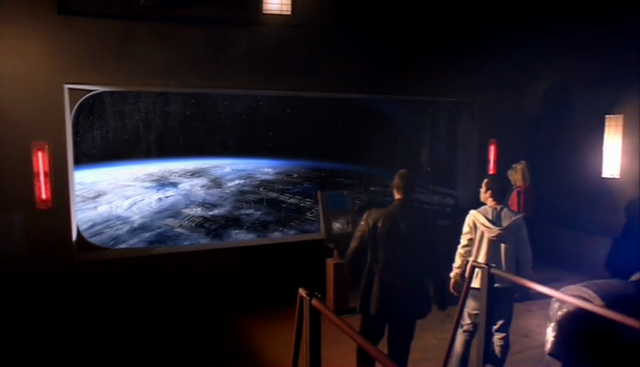
The long game – maybe not full of wonders, but not lacking them, either
Lies and truths
In my opinion, the central theme of The long game is lying. The whole Satellite 5 is one big machine of distributing lies. Suki is accused to be a “liar” by the Editor. Adam is lying to Rose and the Doctor. I’d prefer not to get into the (in)famous discussion about whether lying to prevent murder is morally acceptable – I am definitely not competent enough to take part in it, and it id not touched upon in the episode anyway – but let me point out a few associations with the story itself.
First of all, it is clear that the Editor is a hypocrite. He basically oversees an army of professional liars, and then gets angry at Suki for lying to him (or to the company). Given his cynical attitude, I don’t even think he justified to himself the lies his “journalists” told people, and I guess the episode could be much more interesting if he did. Having some greater good in mind – peace, for example – could introduce a moral dilemma and give viewers some food for thought. Without it, the Editor’s character falls a bit flat and has no redeeming qualities whatsoever. Stories where the “villain” is not completely evil (like the previous one, despite the monster of the week being a Dalek of all things!) or not evil at all (like the next one, which we will discuss in two weeks) are much more interesting and thought-provoking.
It is also a pity that this is one of the earlier episodes, where the Doctor’s reputation as a liar seems not yet established explicitly. If they went that way, the writers could explore an interesting territory – the Doctor meeting an enemy and recognizing himself in him. (And yes, we had that already last time in Dalek, but in that episode the Doctor mirrored the hate of his antagonist. I would love to see an episode where the Doctor condemns someone specifically for lying, only for his companion to point out that he’s a notorious liar, too.)
The third thought I’d like to share here is that the Editor seems to have some sixth sense for truth detection. For example, at one point he says “Something is wrong. Something fictional”. Apart from a cute straining the fourth wall (it doesn’t get broken per se, but the tension is undoubtedly there!), it strongly suggests that the Editor can somehow (subconsciously?) see through lies. This is an interesting, but in the end a weak concept. The reality of lying is much sadder, I think. I do not have any hard data to support this, but I would conjecture that many habitual liars tend to believe their own lies after a while, and they may even have trouble telling their lies from the facts. Even though we are all sinners, I think most people want to do good, and if they don’t, they try really hard to justify their actions to themselves. In case of lying, this may mean convincing themselves that what they tell is actually true (maybe only to some extent, maybe just from a certain point of view, etc., but still). I find it hard to imagine that a man drowning in lies has some mysterious ability to intuitively detect other people’s lies – if anything, he would rather suspect everyone is lying all the time, and not believe anything they hear. And even if we assume the Editor has such an unlikely ability, it’s even worse that the writers did not go further with it and didn’t confront a lying Doctor with him. (For example, if this story came before Dalek, the Doctor might say something about the Time War, implying he was not involved or not guilty or something similar, and we could have a much subtler indication that it was the Doctor who brought about the destruction of Daleks and Time Lords.)
It’s also easy to miss, but very interesting that the episode’s very beginning is about Rose lying to Adam (or at least deceiving him) in order to impress him – and by the way, with full support from the Doctor. The scene is quite funny, and could be powerful if referred to later. (Also, the lie could be, so to speak, disarmed, and turned into a joke if Rose explained everything to Adam later.) Here is my personal interpretation, which is rather meta, and I’m almost 100% sure was not intended, but I like it anyway. If you begin with “white lies”, seemingly harmless, you’ll end up lying big time. And this is exactly what this episode does – it begins with a very small lie intended as a joke, and as the story progresses, there are more and more serious lies. It’s a slippery slope, and it’s really better to avoid playing the game of cheating at all than to try to tiptoe around some imaginary boundary between “good” (or at least “harmless”) lies and “bad” (or hurtful) lies, sooner or later moving the goalposts.
Another topic related to lies which was just touched upon but not expanded – and again, it’s a pity! – was that of Suki’s (or rather Eva’s) true indentity. This is yet another person who is lying – this time, for a noble cause. Frankly, I’m not entirely sure what to make of it. On the one hand, this seems one of these rare cases when there is a genuine conflict between two values – fighting an unjust régime and truthfulness. (Let’s put aside the fact that the Editor was lying and overseeing a huge deceit operation, but he wasn’t directly threatening anybody’s life. This would mean that Eva pulling a gun on him is much more difficult to justify.) On the other hand, we are told that Eva is a member of an anarchist group – so she is basically figthing evil with another evil. Even worse, it is her who causes the Editor’s death at the end (it is unclear if she was acting on her own, somehow regaining some residual consciousness, or if she was a mindless puppet of the dying Jagrafess, but I would suspect the former). At that point, the Editor might have been much less if at all dangerous (especially that the Doctor was there!), and killing him was probably an unnecessary, well, overkill. My tentative position on this situation is more or less this. (Although it could be fascinating to hear from someone disagreeing with me.) While it’s technically true that is some extreme situations it is morally acceptable to actively deceit someone, it is very dangerous to the person doing the deception. If you are not aware of the risk and do not have a strong moral spine, you may again end up going down the slippery slope (which is represented here by killing a defenceless person). And let’s remember that judging oneself to have a strong moral spine is never reliable – nemo iudex in re sua, as Romans put it.
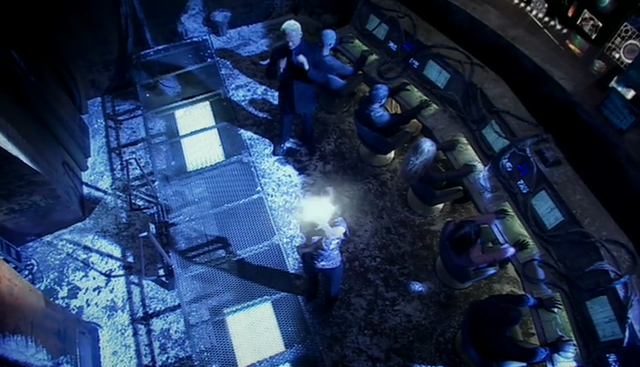
Don’t shoot him, he’ll shrug it off. Just turn up the heating!
And of course, Adam – who is lying to almost everyone in this episode (to Rose, to the Doctor, but also to the nurse on Floor 16 and to his own mother in the end). While Rose’s lie was actually funny, and Suki’s/Eva’s lie is (to some extent) understandable, Adam’s lies are simply pathetic. The very fact that other characters fall for them strains my suspension of disbelief, and of course the Doctor finally sees through it all. (Interestingly, he had no way of knowing that Adam sent some information to his parents’ answering machine, but still somehow guesses it.) And of course, being the Doctor, he did give Adam a second chance (“Is there something else you want to tell me?”), which Adam promptly rejected, earning a dubious honor of being the first and only companion to be expelled from the T.A.R.D.I.S. for bad behavior.
Adam
Speaking of Adam – I have one more association about him. It seems so obvious and yet I found no trace of anyone on the Internet saying this, which baffles me a lot.
So, let’s sum it up. We have a character who is tempted by a woman with a promise involving possessing knowledge he should not have. He succumbs to the temptation. When asked about it by an authority figure, he denies his guilt and tries to shove it onto the person asking. As a result, he is expelled from a beautiful place full of wonders, but otherwise left unharmed. Does that remind you of anything? Not yet? How about the fact that that character’s name is Adam?
I mean, there is nothing wrong with being inspired by the Bible, but this seems a bit… heavy-handed (again). Notice, however, that there are also important differences between this and the Biblical story. Interestingly, Satan – the serpent in the account of Genesis 3 – is completely absent here. We’ll get back to this in 16 episodes’ time, if I manage to go that far with this weblog. A friendly reminder: this also depends on you, dear reader! But this is perhaps the first episode of New Who where the Doctor is hinted to be – or rather consider himself – a God-like figure. This idea will be rather subtly touched upon in Series 2 and 3, and will become much more important in Series 4 (in which, for the sake of this weblog, I also include the David Tennant specials).
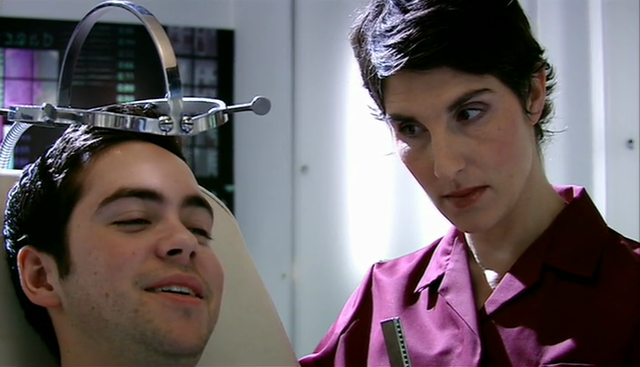
Let’s get myself a hole in the skull, opening on a click of the fingers. What could possibly go wrong?
Anyway, it goes without saying that Adam is the second most tragic figure in The long game. We’ll look again what can happen if the Doctor’s companion disappoints him in two week’s time, and then a month later, too. And while the next episode gives one possible answer to why the Doctor kicked Adam out of the T.A.R.D.I.S., let me state a slightly less obvious reason. Adam – who previously worked for van Statten – started doing more or less the same thing, using technology outside current knowledge of humanity for personal benefits. What if being left home was actually an act of mercy? What if the Doctor saw what Adam could become if he continued with him, and wanted to spare him that…?
Other tidbits
Let me now very briefly mention a few other things that caught my eye, in no particular order and without further analysis.
I know I’ve said it a few times already, but I quite like the caring aspect of Rose’s personality. When she and the Doctor get to Floor 500, one of the first things Rose does is rush to Suki, someone whom she only knew for a few minutes. That’s nice.
I can’t help laughing every time I see the “futuristic” design of Satellite 5. Of course, the trope is subverted as the human technology is apparently stifled by Jagrafess, but still. It’s even worse than Platform One.
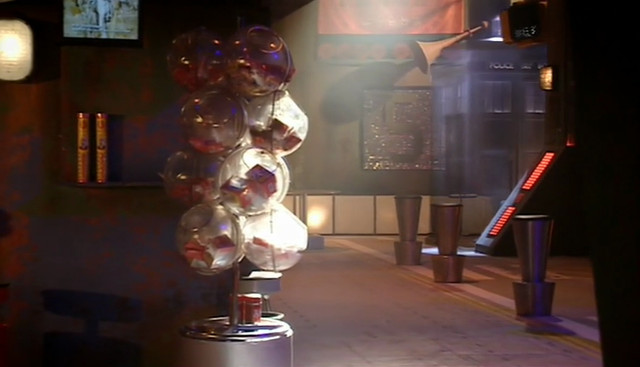
Judging by the architecture, I’d say we’re around the year 2005.
The “Bad Wolf TV” channel where the Face of Boe announces his (?) pregnancy is just plain weird, but of course the writers wanted to throw in something related to the main story arc.
Also, I love the moment when something finally clicks for Cathica and she says “You’re not management, are you?”, to which the Doctor replies with a deadpan “At last she's clever”.
Speaking of Cathica, although she turned completely fine, for all she knew she was ready to sacrifice her life to save the day. Again, this is a recurring theme, and it will culminate in Series 4.
Another quip I loved was when the nurse asked the completely clueless Adam “What are you, a student?”. As someone who used to deal with students on a daily basis for over a decade, I found this infinitely hilarious.
And if there is any tech from Doctor Who which would be cool to have in real life, I might go for the vomitomatic. Come on, this would be really great!
Speaking of technology – this episode is probably the first one where Rose used the sonic screwdriver (when freeing the Doctor from the shackles).
Last but not least
As you can see, even though The long game is considered one of the weaker stories in Series 1 (if not the weakest), there is some serious food for thought here. And I didn’t even touch upon everything! For example, even this early in New Who we know how important names are to the Doctor. One of the first things the Doctor did on meeting Rose was ask her name. One of the first things Rose did on meeting one of her first aliens (Raffalo in The end of the world) was ask her name. One of the few things Harriet Jones did wrong in World War III was not asking Indra Ganesh his name.
And yet the name of the Editor is never stated. Not even in the script. Even Adam’s mother’s name was stated at some point. (Admittedly, nobody calls her by name in the episode, and even the script doesn’t mention it, but we know that she’s called Sandra from the vast trove of Doctor Who literature.)
Not so much for the Editor. When he says “I’m the Editor”, I get shivers, because what I hear is basically this:
[H]is name is remembered in no tale; for he himself had forgotten it, and he said: ‘I am the Mouth of Sauron.’
Continuing the discussion about Adam, names are also extremely important in the Bible. One example is when God says, “Do not fear, for I have redeemed you; I have called you by name: you are mine” (Isaiah 43:1b). Now, if you yourself forget your name when serving an evil master (or spoiler for series 1evil masters), it’s almost like telling God that you do not want to be redeemed – basically rejecting God, love, and happiness in Heaven. That is why I said that Adam is the second most tragic figure in this episode – the sad distinction of being the first one goes to the Editor…
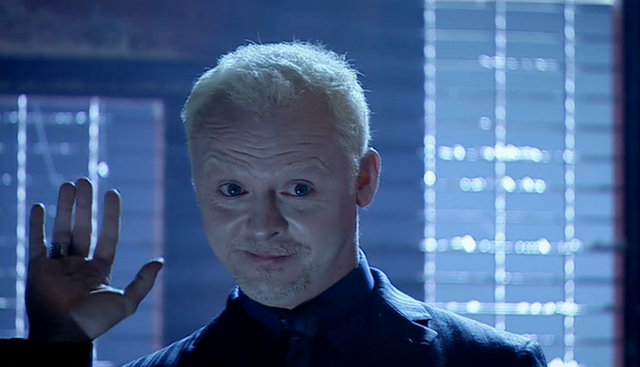
I’m the Editor. I am the most tragic person in this episode and I know it, so I’m smiling like a clown. Don’t be like me.